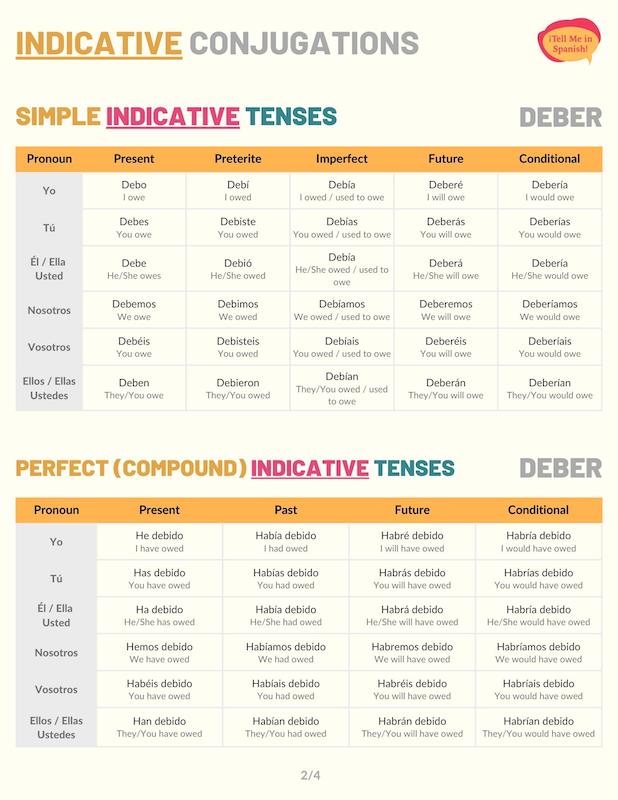Deber is an essential -ER verb since it allows you to express obligation. Additionally, it’s an easy verb that will help you get familiar with the -ER conjugation model. So, in this guide, we’ll review deber conjugation charts for the most important tenses.
- Deber Overview
- Indicative Tenses of Deber Conjugations
- Subjunctive Tenses of Deber Conjugations
- Imperative (Commands) of Deber Conjugations
- Uses & Examples
- Download Deber Conjugation Tables & Uses Cheat sheets
- Deber Conjugation Practice Quiz
Overview of Deber
| Verb Characteristic | Property |
|---|---|
| Verb Type | -ER |
| Irregular | No |
| Infinitive | Deber |
| Gerund (Present Participle) Form | Debiendo |
| Past Participle Form | Debido |
| Synonyms | Tener que, necesitar. |
In Spanish, deber means ‘to owe’, ‘to have to’, ‘should’, or ‘to need to’. The conjugation charts below include only one translation to keep the tables as organized as possible. You can learn more about how to use ‘deber’ in the Uses & Meanings section.
Indicative Conjugations of Deber
Present tense
Deber present tense conjugations refer to the things people must do or debts they owe. For example: ¿Cuánto dinero debes?
| Person | Conjugation | Translation |
|---|---|---|
| Yo | Debo | I owe |
| Tú | Debes | You owe |
| Él / Ella Usted | Debe | He/She owes You (formal) owe |
| Nosotros | Debemos | We owe |
| Vosotros | Debéis | You owe |
| Ellos / Ellas Ustedes | Deben | They owe You (plural) owe |
Preterite tense
Deber conjugation in the preterite tense refers to the things people owed or past obligations someone had to do. For instance: Por años, mis amigos me debieron mucho dinero.
| Person | Conjugation | Translation |
|---|---|---|
| Yo | Debí | I owed |
| Tú | Debiste | You owed |
| Él / Ella Usted | Debió | He/She owed You (formal) owed |
| Nosotros | Debimos | We owed |
| Vosotros | Debisteis | You owed |
| Ellos / Ellas Ustedes | Debieron | They owed You (plural) owed |
Imperfect tense
In the Spanish imperfect past tense, this verb refers to the things people used to owe for a long period of time. For instance: ¿Por qué debías tanto dinero?
| Person | Conjugation | Translation |
|---|---|---|
| Yo | Debía | I owed I used to owe |
| Tú | Debías | You owed You used to owe |
| Él / Ella Usted | Debía | He/She owed He/She used to owe You (formal) owed You (formal) used to owe |
| Nosotros | Debíamos | We owed We used to owe |
| Vosotros | Debíais | You owed You used to owe |
| Ellos / Ellas Ustedes | Debían | They owed They used to owe You (plural) owed You (plural) used to owe |
Near future
Deber’s near future forms are conjugated by using the present forms of ‘ir’ + a + deber. When using these conjugations, you’re expressing that a person is going to owe something soon in the future. For example: Si no pago, le voy a deber muchos intereses al banco.
| Person | Conjugation | Translation |
|---|---|---|
| Yo | Voy a deber | I’m going to owe |
| Tú | Vas a deber | You’re going to owe |
| Él / Ella Usted | Va a deber | He/She is going to owe You (formal) are going to owe |
| Nosotros | Vamos a deber | We’re going to owe |
| Vosotros | Vais a deber | You’re going to owe |
| Ellos / Ellas Ustedes | Van a deber | They’re going to owe You (plural) are going to owe |
Take Note: In this tense, it’s more common to use the verb tener to talk about obligations – van a tener que hablar con su papá (you’re going to have to talk to your dad).
Future simple tense
Conjugate deber to the future simple tense to express future obligations or that someone will owe something. Ya no te deberé nada.
| Person | Conjugation | Translation |
|---|---|---|
| Yo | Deberé | I will owe |
| Tú | Deberás | You will owe |
| Él / Ella Usted | Deberá | He/She will owe You (formal) will owe |
| Nosotros | Deberemos | We will owe |
| Vosotros | Deberéis | You (formal) will owe |
| Ellos / Ellas Ustedes | Deberán | They will owe You (plural) will owe |
Conditional tense
As shown in the deber conjugation chart below, this verb is regular when conjugated to the Spanish conditional tense. Use these forms to say that someone would owe something. For example: Si no compraras tantas cosas, no deberías tanto dinero.
| Person | Conjugation | Translation |
|---|---|---|
| Yo | Debería | I would owe |
| Tú | Deberías | You would owe |
| Él / Ella Usted | Debería | He/She would owe You (formal) would owe |
| Nosotros | Deberíamos | We would owe |
| Vosotros | Deberíais | You would owe |
| Ellos / Ellas Ustedes | Deberían | They would owe You (plural) would owe |
Present perfect tense
In Spanish, the present perfect is formed with present forms of haber + the past participle form of ‘deber’. These conjugations are used to say that someone has or hasn’t owed something. You can also use these forms to talk about the obligations someone has had in the past.
For example: ¿Nunca han debido nada?
| Person | Conjugation | Translation |
|---|---|---|
| Yo | He debido | I have owed |
| Tú | Has debido | You have owed |
| Él / Ella Usted | Ha debido | He/She has owed You (formal) have owed |
| Nosotros | Hemos debido | We have owed |
| Vosotros | Habéis debido | You have owed |
| Ellos / Ellas Ustedes | Han debido | They have owed You (plural) have owed |
Past perfect
You can conjugate deber to the past perfect tense in Spanish to mention that someone had or hadn’t owed something before another past reference point. Nunca había debido tanto dinero.
| Person | Conjugation | Translation |
|---|---|---|
| Yo | Había debido | I had owed |
| Tú | Habías debido | You had owed |
| Él / Ella Usted | Había debido | He/She had owed You (formal) had owed |
| Nosotros | Habíamos debido | We had owed |
| Vosotros | Habíais debido | You had owed |
| Ellos / Ellas Ustedes | Habían debido | They had owed You (plural) had owed |
Future perfect
Conjugate deber to the future perfect tense to express that someone will have owed something by or before a specific future time frame. Additionally, these forms allow you to say that someone might have owed something. ¿Cuánto habrá debido Julián?
| Person | Conjugation | Translation |
|---|---|---|
| Yo | Habré debido | I will have owed |
| Tú | Habrás debido | You will have owed |
| Él / Ella Usted | Habrá debido | He/She will have owed You (formal) will have owed |
| Nosotros | Habremos debido | We will have owed |
| Vosotros | Habréis debido | You will have owed |
| Ellos / Ellas Ustedes | Habrán debido | They will have owed You (plural) will have owed |
Conditional perfect
In Spanish, the conditional perfect forms of deber express that someone would have owed something if a past circumstance had been met. Si no nos hubieras ayudado, no sé cuánto dinero le habríamos debido al banco.
| Person | Conjugation | Translation |
|---|---|---|
| Yo | Habría debido | I would have owed |
| Tú | Habrías debido | You would have owed |
| Él / Ella Usted | Habría debido | He/She would have owed You (formal) would have owed |
| Nosotros | Habríamos debido | We would have owed |
| Vosotros | Habríais debido | You would have owed |
| Ellos / Ellas Ustedes | Habrían debido | They would have owed You (plural) would have owed |
Progressive tenses
The progressive forms of deber emphasize that a person owes something at the moment of speaking. Use estar indicative conjugations + the present participle form of ‘deber’ to form these tenses. Although the Spanish progressive tenses are frequently used in daily conversations, deber’s forms are not as common.
| Progressive Tense | Formula | Translation Example |
|---|---|---|
| Present | Estar (present) + debiendo | I am owing |
| Preterite | Estar (preterite) + debiendo | You were owing |
| Imperfect | Estar (imperfect) + debiendo | He was owing |
| Future | Estar (future) + debiendo | We will be owing |
| Conditional | Estar (conditional) + debiendo | They would be owing |
Deber Subjunctive Conjugations
Use the subjunctive mood in Spanish to talk about someone’s hopes, expectations, demands, advice, doubts, or to present hypothetical situations. Below, you’ll find the deber conjugation charts for the most common subjunctive tenses.
Present subjunctive
In the Spanish present subjunctive, deber is a regular verb. These subjunctive conjugations allow you to communicate hopes, advice, or requests regarding someone owing something. For instance: Espero que ya no le debas dinero a tu hermano.
| Person | Conjugation | Translation |
|---|---|---|
| Yo | Deba | I owe |
| Tú | Debas | You owe |
| Él / Ella Usted | Deba | He/She owes You (formal) owe |
| Nosotros | Debamos | We owe |
| Vosotros | Debáis | You owe |
| Ellos / Ellas Ustedes | Deban | They owe You (plural) owe |
Present perfect subjunctive
In Spanish, the present perfect subjunctive is formed with haber (present subjunctive) + debido. These deber’s conjugations are used to express doubt, wishes, or wonder how much a person has owed. For example: ¿Crees que Julián le haya debido mucho dinero a Tom?
| Person | Conjugation | Translation |
|---|---|---|
| Yo | Haya debido | I have owed |
| Tú | Hayas debido | You have owed |
| Él / Ella Usted | Haya debido | He/She has owed You (formal) have owed |
| Nosotros | Hayamos debido | We have owed |
| Vosotros | Hayáis debido | You have owed |
| Ellos / Ellas Ustedes | Hayan debido | They have owed You (plural) have owed |
Imperfect subjunctive
The imperfect subjunctive conjugations of deber allow you to talk about past suggestions, demands, or hopes you had about someone owing something. For instance: Esperaba que ya no debiéramos tanto.
Depending on whether you speak Latin American or Castilian Spanish, the imperfect subjunctive tense has two conjugation models:
Latin American Spanish version
| Person | Conjugation | Translation |
|---|---|---|
| Yo | Debiera | I owed |
| Tú | Debieras | You owed |
| Él / Ella Usted | Debiera | He/She owed You (formal) owed |
| Nosotros | Debiéramos | We owed |
| Ellos / Ellas Ustedes | Debieran | They owed You (plural) owed |
Note: Because the pronoun ‘vosotros’ is not used in Latin American Spanish, the deber conjugation for this pronoun hasn’t been included in the previous chart.
Castilian Spanish version
| Person | Conjugation | Translation |
|---|---|---|
| Yo | Debiese | I owed |
| Tú | Debieses | You owed |
| Él / Ella Usted | Debiese | He/She owed You (formal) owed |
| Nosotros | Debiésemos | We owed |
| Vosotros | Debieseis | You owed |
| Ellos / Ellas Ustedes | Debiesen | They owed You (plural) owed |
Past perfect subjunctive
When conjugated to the Spanish past perfect subjunctive, deber conveys that someone would have owed something if they had performed an action. For instance: Hubieran debido mucho dinero si hubieran comprado ese teléfono.
| Person | Conjugation | Translation |
|---|---|---|
| Yo | Hubiera debido | I had owed |
| Tú | Hubieras debido | You had owed |
| Él / Ella Usted | Hubiera debido | He/She had owed You (formal) had owed |
| Nosotros | Hubiéramos debido | We had owed |
| Vosotros | Hubierais debido | You had owed |
| Ellos / Ellas Ustedes | Hubieran debido | They had owed You (plural) had owed |
Deber Imperative Conjugations
The imperative mood is used to give commands in Spanish. Use the affirmative imperative to tell people what to do and the negative imperative to order them not to do something.
Affirmative commands
Deber’s affirmative commands are not as common in this context because it’s uncommon to command people to be in debt or to owe something.
| Person | Conjugation | Translation |
|---|---|---|
| Tú | Debe | Owe |
| Usted | Deba | Owe |
| Vosotros | Debed | Owe |
| Ustedes | Deban | Owe |
Take Note: To remind people what they must do, use the subjunctive conjugations. Niños, deben estudiar más.
Negative commands
However, you can use this verb’s negative imperative forms to strongly suggest people not to owe money (go into debt) or something else. For example: No deban lo que no tienen.
| Person | Conjugation | Translation |
|---|---|---|
| Tú | No debes | Don’t owe |
| Usted | No deba | Don’t owe |
| Vosotros | No debáis | Don’t owe |
| Ustedes | No deban | Don’t owe |
Meanings of Deber & Examples
Now that we’ve reviewed how to conjugate deber in Spanish, you should check this section to learn how to use this verb. Depending on what you wish to convey and the parts of speech you use, deber means to:
- Owe
- Have to
- Must (must have if combined with the verb haber)
- Should (should have if combined with the verb haber)
[Deber conjugated] + [complement]
No debí haberles dicho nada.
I shouldn’t have said anything to you.
Oye, todavía me debes cien dólares.
Hey, you still owe me one hundred dollars.
Si quieres ser más sano, debes comer bien y hacer ejercicio.
If you want to be healthier, you must eat well and exercise.
Take Note: When talking about owing something to someone, you must use indirect object pronouns in Spanish. Also, notice that when expressing obligation, deber must be combined with an infinitive verb.
Download Deber Conjugation Charts & Uses Cheat sheets

Deber is one of the most common and useful verbs to learn to become fluent in Spanish. So, I’ve created cheat sheets PDF you can download which includes all of the deber conjugation charts as well as its defintions and real-world examples so you can master conjugating and using this verb in your conversations.
Practice Quiz: Deber Conjugation

Now that you know how to conjugate deber, you can put your knowledge to the test by taking the deber conjugation practice quiz. It’s also a great way to practice conjugating Spanish -ER verbs.



